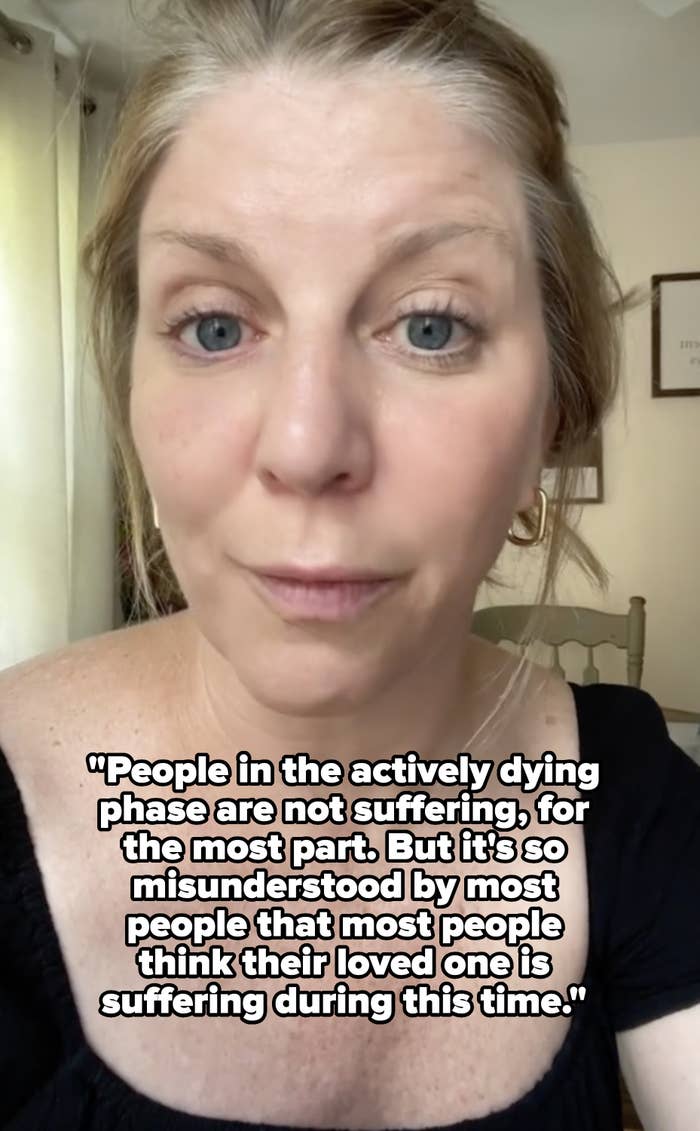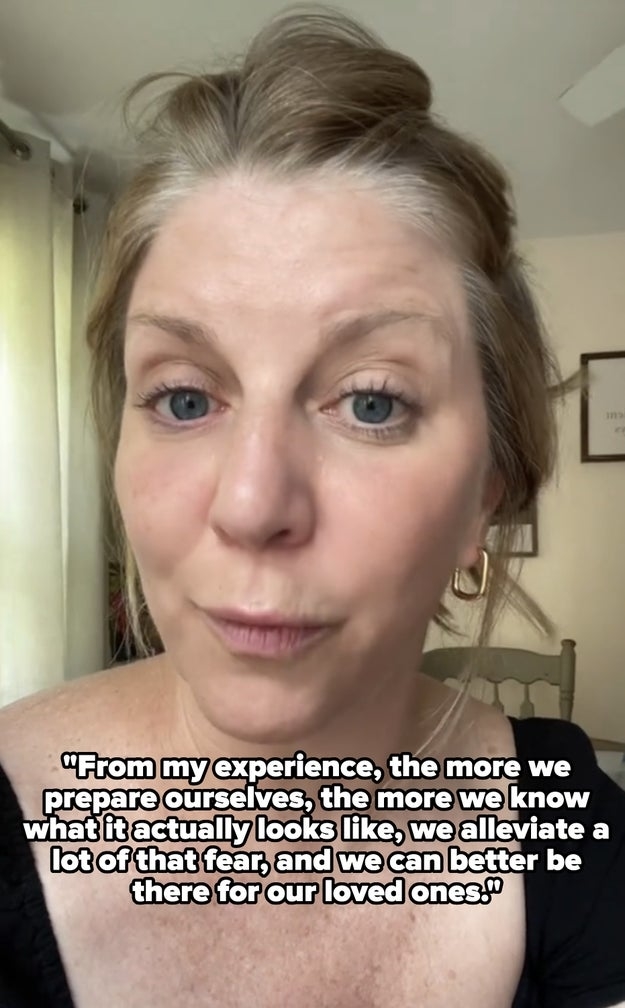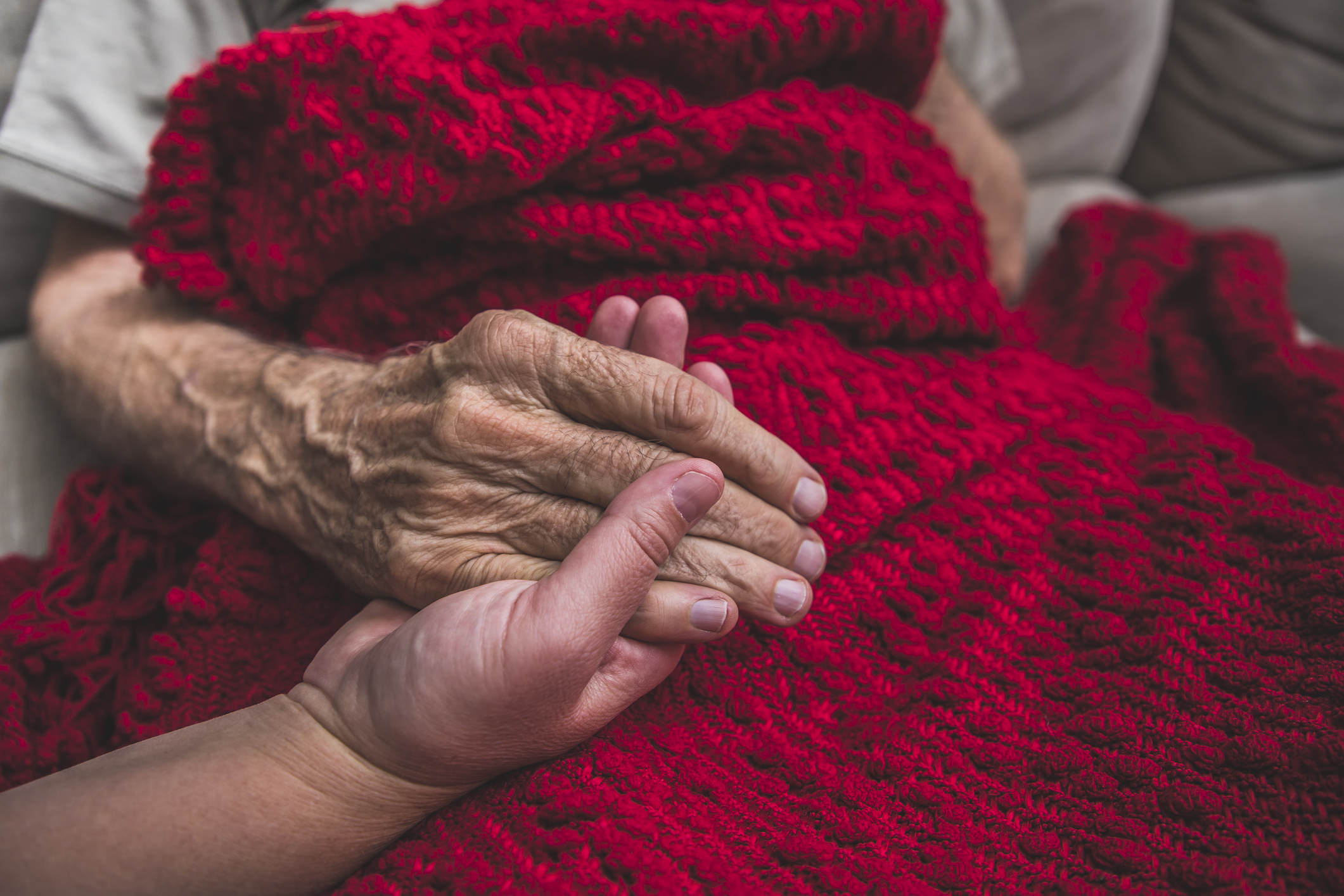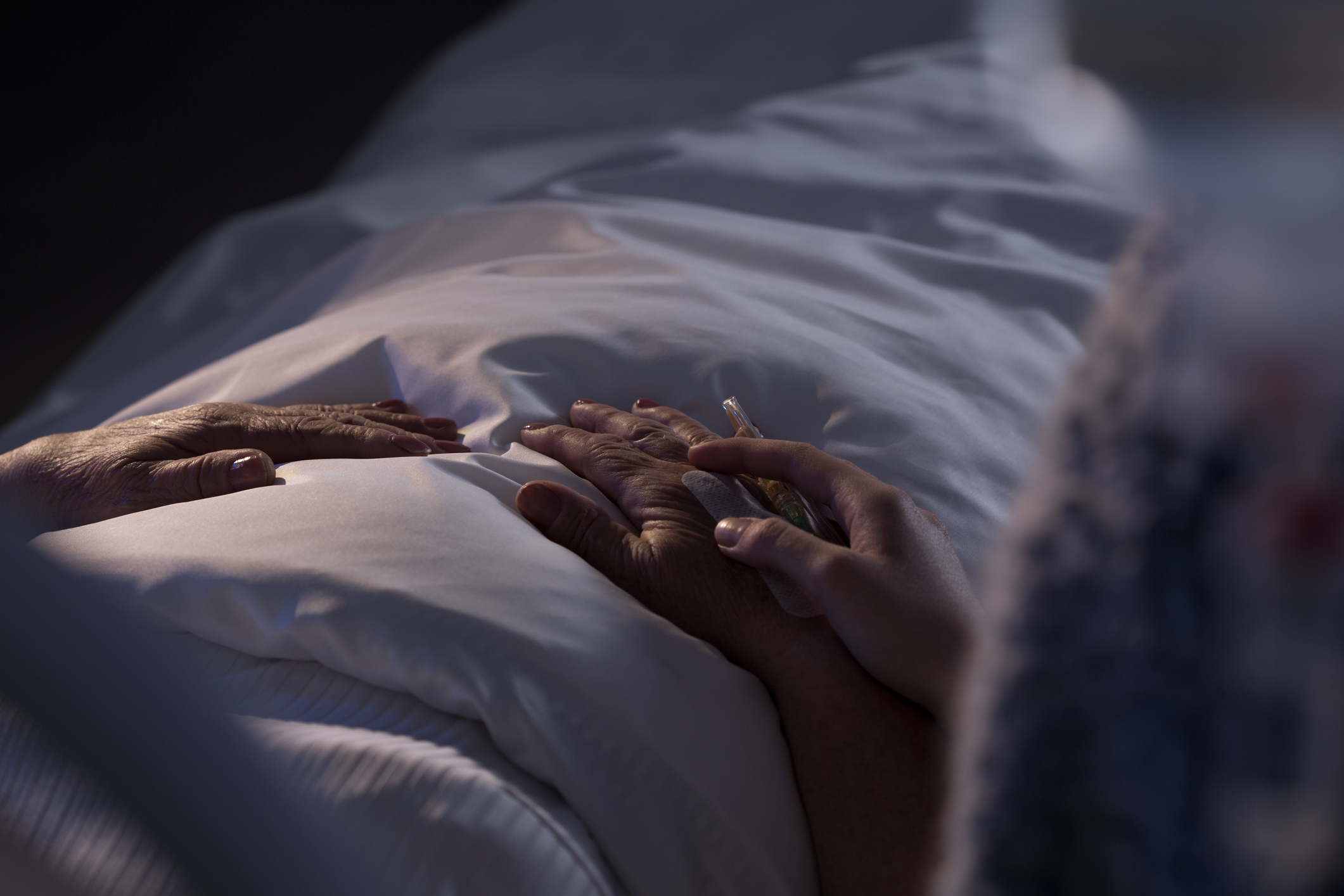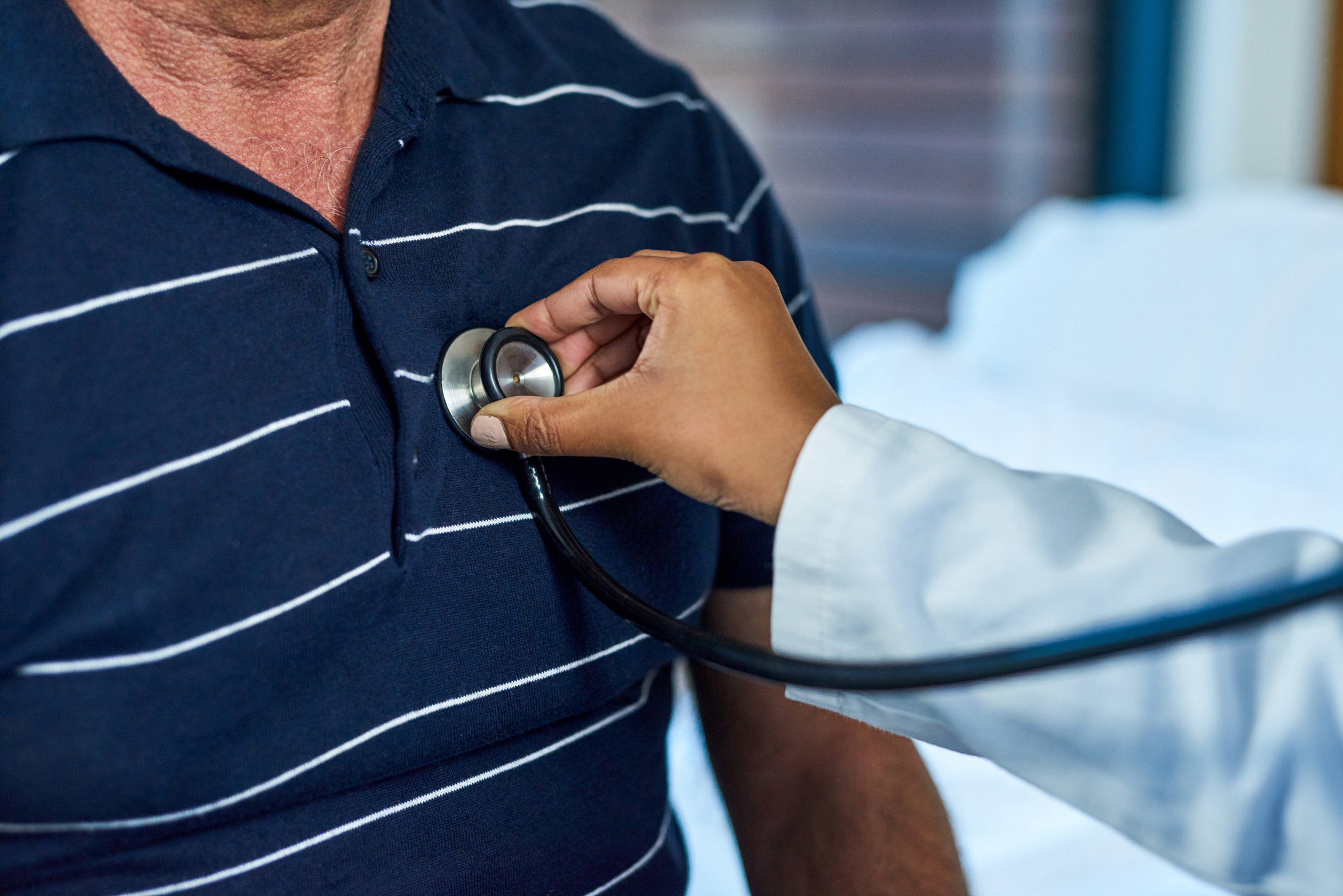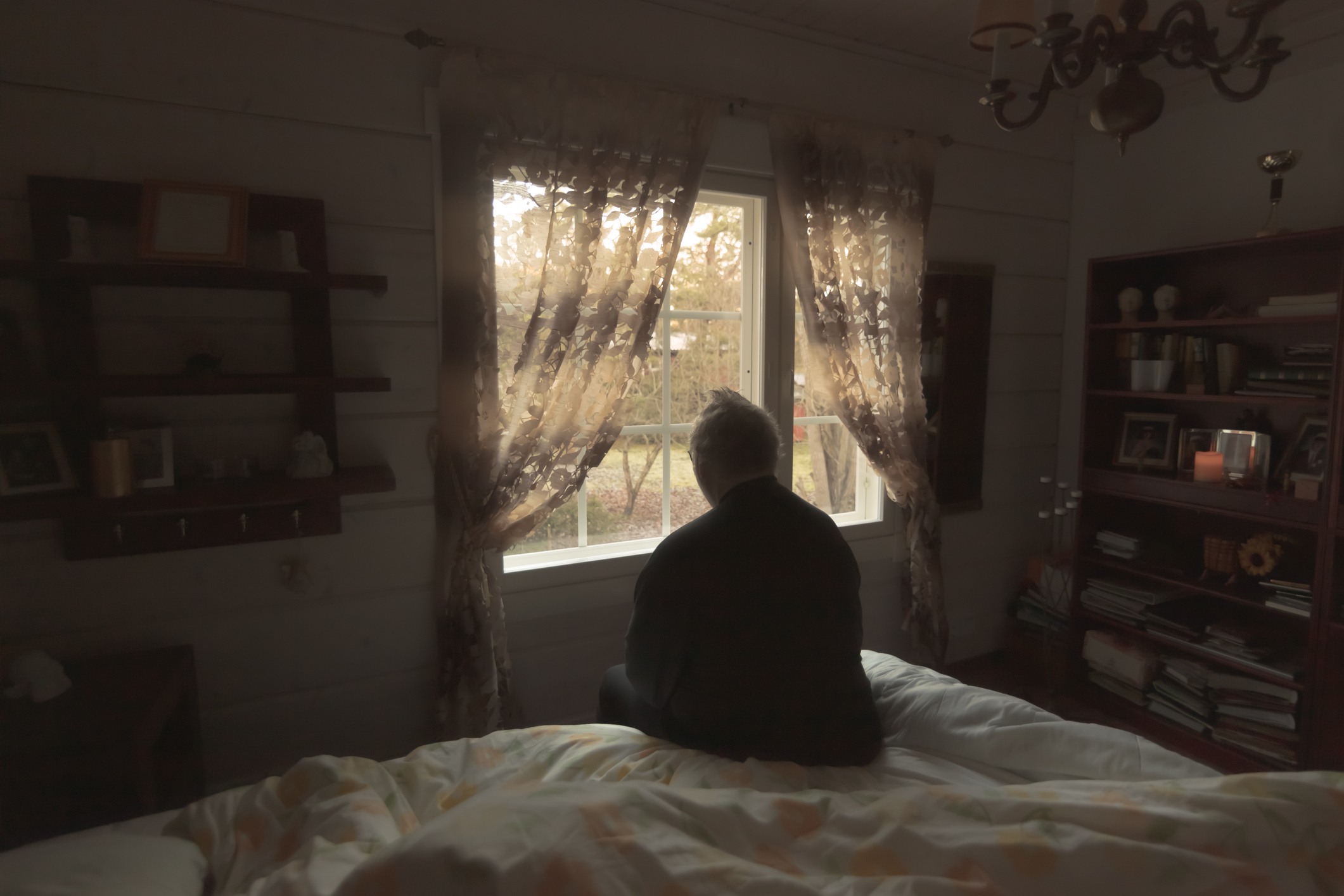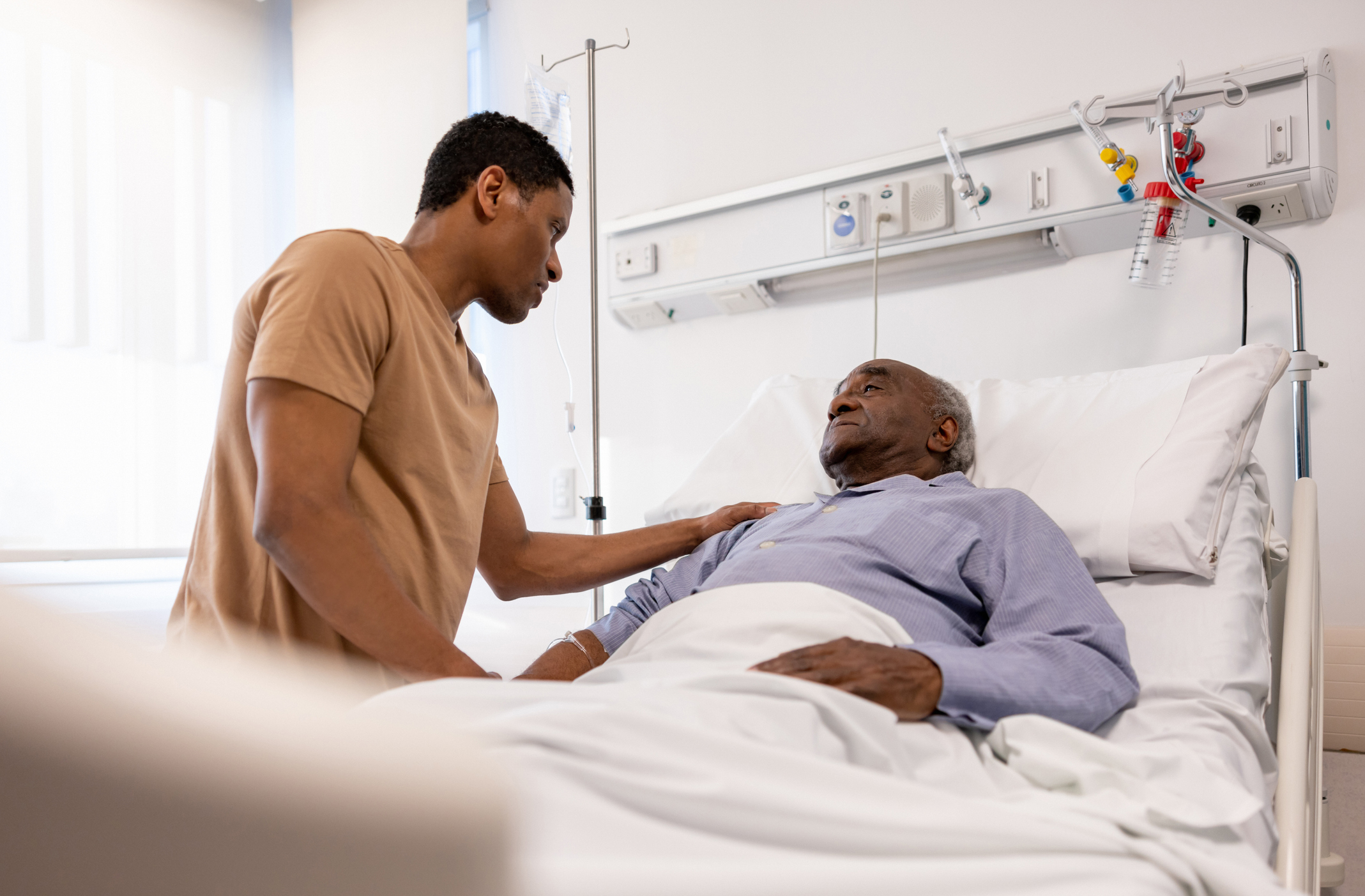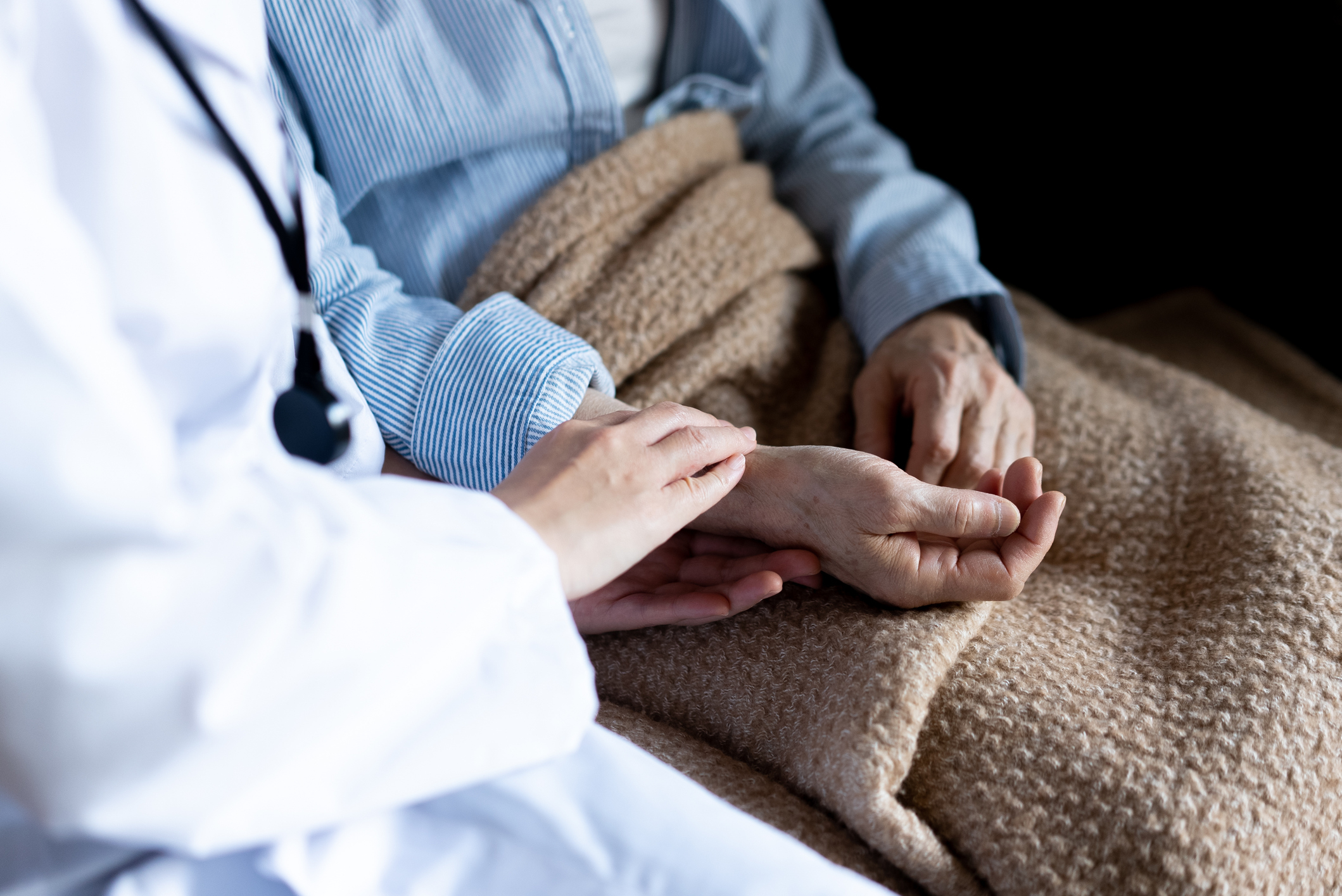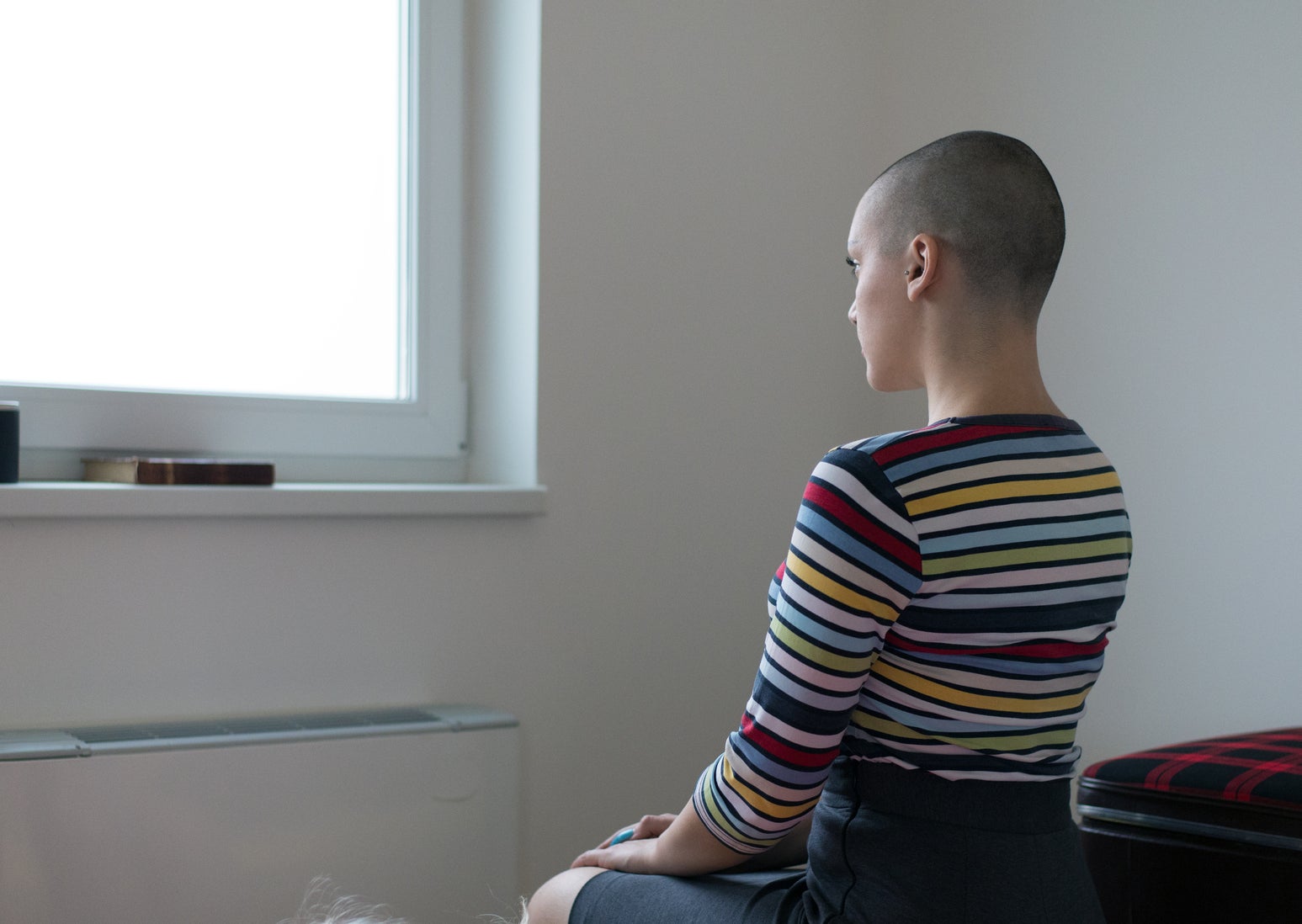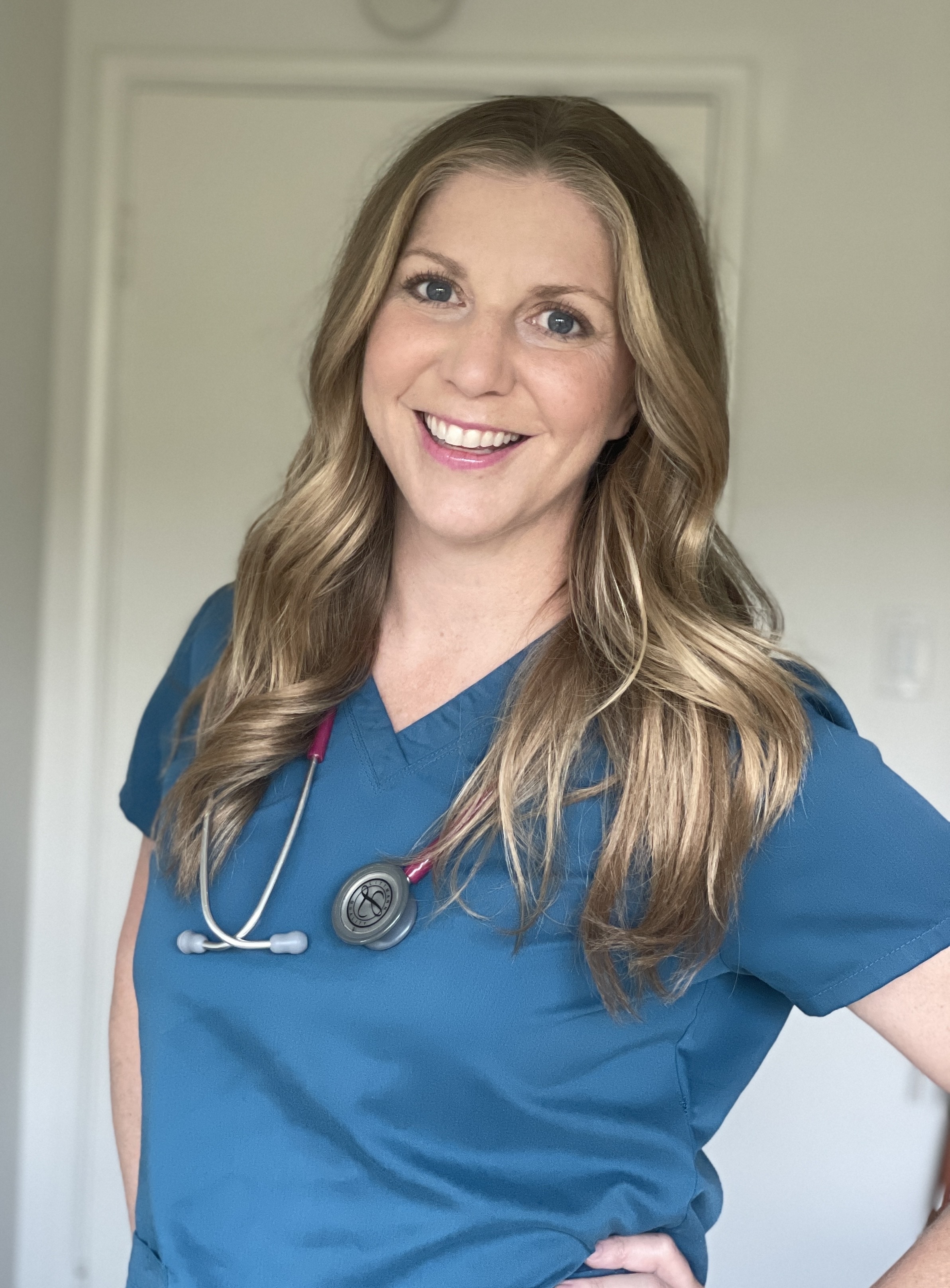" I guess education can facilitate fall veneration and [ help us ] truly realize and contemplate our mortality . " — @hospicenursejulie
Recently,we wrote about what the actively dying phase looks like, which occurs during the last phase of life. This was thanks to the help of hospice nurse Julie McFadden, aka@hospicenursejulie, who educates about death and dying on TikTok.
Julie, whoseviral videoabout the actively dying phase now has almost 9 million views on TikTok, taught us about symptoms that may appear scary but are entirely normal — like thedeath rattle, the “rally,“end-of-life visioning, and “fish out of water” breathing.
Julie wants to alleviate some of that fear around death and dying — she says that by educating ourselves about the final stages of life, “we can better be there for our loved ones.”
Now that Julie has educated us about the actively dying phase (I recommend that youread the articleorwatch her videoif you haven’t yet), and hundreds havealso shared what they wish they knew about death and dyingbefore witnessing their own loved one’s death,I askedtheBuzzFeed Communitythe lingering questions still on their mind.
From the practical (like does it hurt?), to the taboo (do our bodily fluids really justrelease?) and the personal (how can we deal with our death anxiety?) — here are all your questions that Julie answered about death and dying:
1.“What does the actively dying phasefeel liketo the dying person? Do we know?”
2.“When someone is dying, can they hear or feel us?”
3.“When someone is dying, does it hurt?”
JM : So , I always wish to say that dying itself does not spite , specially if you ’re conk a natural dying , mean like from a disease , but you ’re allowing the natural advance to take over . That does not necessarily spite , but the disease and its symptoms can make pain . The factual human action of dying — likely not . But the disease you ’re die from can cause symptoms that make you hurt , hence why we have , you know , Dr. and nurse who can help with those symptoms so you’re able to have an as - passive - as - potential death .
4.“What happens with a pacemaker or defibrillator during the final minutes of death?”
5.“Do you lose control of your bodily fluidsimmediately?”
JM : Not everyone at the end of living will lose ascendance of their consistency fluids . It ’s not like everyone will suddenly pee-pee and defecate because they have died . However , I would say at the end of life in the actively dying phase , everyone will be incontinent . So you will need someone to change you and care for you if you do choke the natural , gradual path . Not everyone does — if you die dead , that likely wo n’t happen . But if you ’re die a gradual , dull , peaceful , comfortable destruction , you do get to a place where you are unconscious , and someone has to change you because you still are urinating and having intestine movements . mayhap not as often as you normally would , but you still have them .
However , when someone die , I reckon there is a small bit of a misconception that the second they die , they urinate and stool . That ’s justnottrue . They can at times , and that ’s because all of the sphincter muscle in our trunk , which keep fluids and waste in until it ’s quick , will relax and relax and then let go of corporal fluid , hence why mass can have fluid come out of their sass . They can have a gut apparent movement ; they can urinate . That can materialize immediately upon decease , but it does n’t always happen . It just depends .
6.“My mom has Alzheimer’s and doesn’t know who anyone is. Will she recognize those at her bedside at the last stage of dying?”
7.“The thing that broke my heart the most was, a few days before my uncle passed away in his late 80s, he started to cry and admitted he was scared. And I had no idea how to respond, so I just held his hand. What are some ways I can 1) respond to this or soothe a scared loved one, and 2) deal with my own fear and anxiety of mortality?”
And then , how can we deal with our own fears , right , ourownfear ? Again , it ’s the same thing . It ’s through talk about it . It ’s through say , " I ’m afraid , I ’m afraid to die , I do n’t need to die , I ’m afraid of it . " That alone . consciousness around the concern can really assist loosen the grip .
I ’ve also heard many the great unwashed who have death anxiety secern me that check , learning , and educating themselves about how the body works during the dying process has help oneself alleviate a lot of their anxiousness . I think didactics can help decrease reverence and [ help us ] truly empathize and contemplate our mortality — knowing it ’s going to bechance , knowing it ’s normal to revere that , and soothing ourselves in the outgrowth . I think it ’s when we abnegate the fear , deny thinking about it , not looking at it , is when the fear increases . I think fear decrease when we do calculate at that care , when we do take the awe , and when we do get a line about what we ’re in reality revere .
I hope that helps . I have a go at it that doubt .
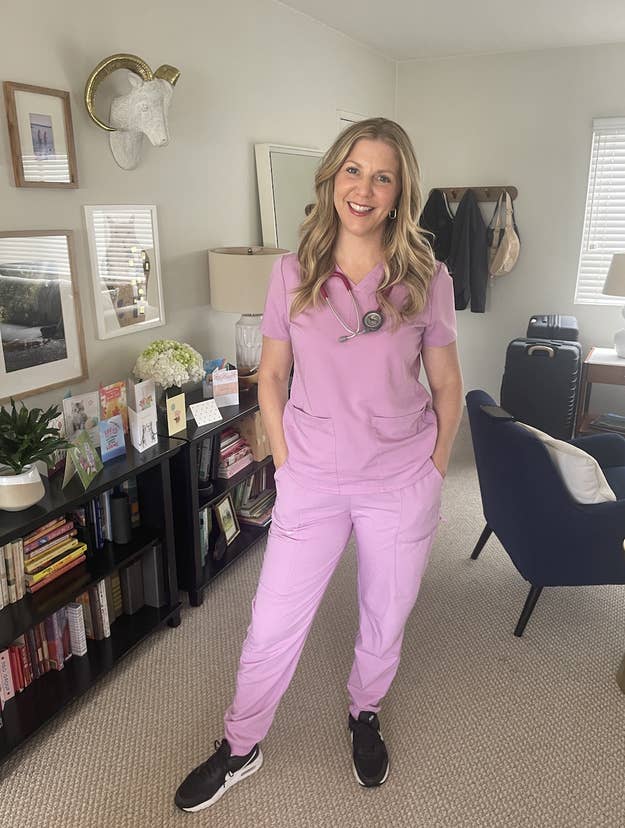
8.“I have 200 medical problems. No exaggeration. I usually have a healthy emotional attitude about it all, but sometimes it’s overwhelming. Will the doctors tell me when they think I’m nearing my time?”
9.“I have incurable cancer and have felt/been very close to dying on several occasions. Medical science has kept me alive thus far. There’s a lot of advice and information about what happens when an older person dies, so my question is, what differences might there be when it’s a younger person? I’m still in my 20s and don’t expect to live to see 40.”
But I will say , because this somebody is asking this enquiry already , I feel like there probably will be less angst . People , even when they ’re young , who have come to term and accept that they ’re dying — which I ’m not say is easy or even necessary to do ; I get if you ’re like , " No , I ’m not going to ever take that " — but people who do run to lease go a little easier at the conclusion .
Now , how can you work on that ? I think this is exactly how it works : by asking questions . Knowing and thinking about your end of biography , how you want it to look , trying to really ponder the fact that it ’s actually going to happen . And because of that , how do you want to spend the ease of your prison term here ? In doing that , you’re able to help get yourself to moderately of an acceptance , more or less of a cognition and a belief , knowing that you ’re move to kick the bucket . So then you’re able to modify the way you ’re living — if you want to change the way you ’re know — to help you find less like you did n’t do the thing you desire to do , or spend the time the way you want[ed ] to pass it . But I feel like the person asking this question is already kind of a stride onwards because they ’re already thinking about it , which is going to facilitate tremendously .
For more information about death and dying, Julie McFadden’s forthcoming book,Nothing to Fear: Demystifying Death to Live More Fully, comes out 25 February 2025. In it, she shares the lessons she’s learned in her 15 years as an RN in hospice and intensive care, answers more of your questions, and destigmatizes conversations around death and dying.
For our previous articles about death and dying, check out these articles:
This Hospice Nurse Is educate citizenry About The “ Actively Dying ” Phase Of Death To Alleviate hoi polloi ’s concern , And It ’s Eye - scuttle
People Who find A Loved One pass away Shared What They Wish They Had Known Beforehand , And It ’s Heartbreaking But Necessary To find out
